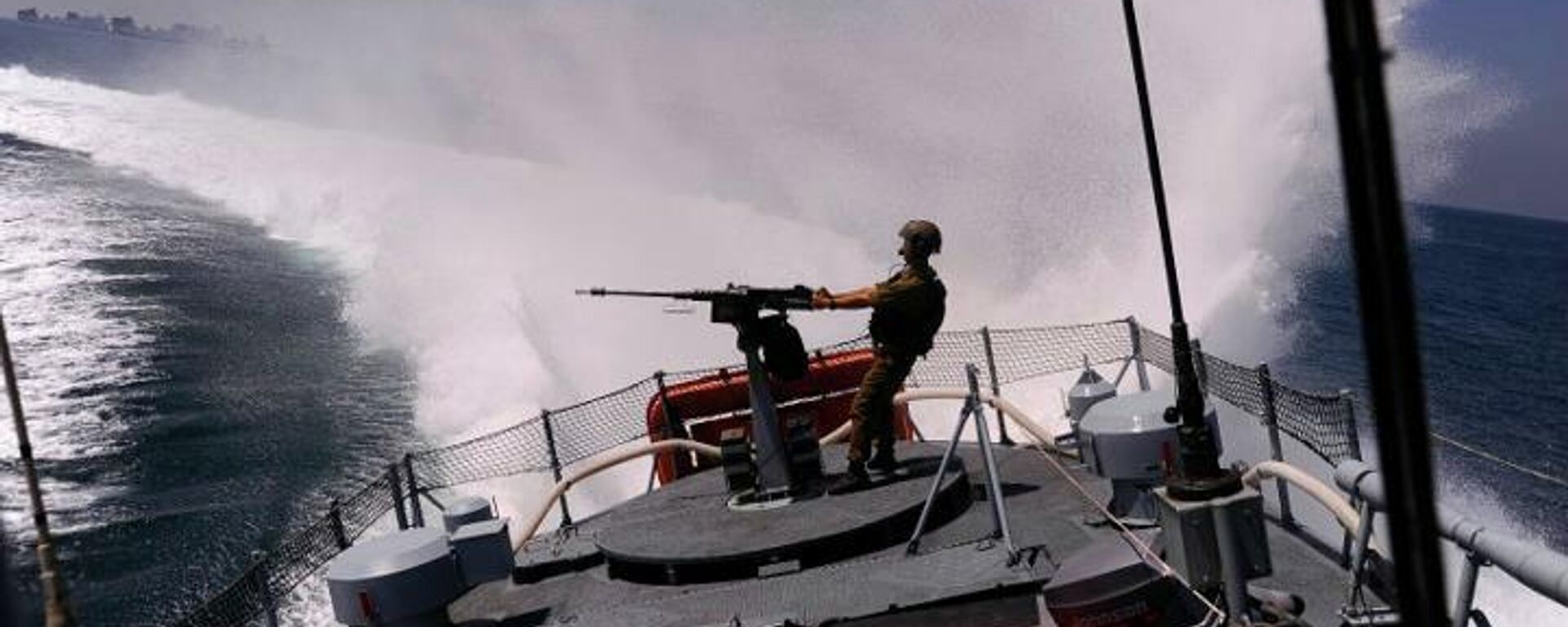https://sputnikglobe.com/20221006/idf-on-standby-as-israeli-defense-minister-gantz-warns-of-possible-escalation-with-lebanon-1101576925.html
IDF on Standby as Israeli Defense Minister Gantz Warns of Possible Escalation With Lebanon
IDF on Standby as Israeli Defense Minister Gantz Warns of Possible Escalation With Lebanon
Sputnik International
Earlier in the day, Israel said that it would reject Lebanon's amendments to a US-brokered proposal on resolving a long-running maritime border dispute over... 06.10.2022, Sputnik International
2022-10-06T14:25+0000
2022-10-06T14:25+0000
2023-01-15T17:27+0000
world
middle east
lebanon
israel defense forces (idf)
maritime dispute
israel
https://cdn1.img.sputnikglobe.com/img/07e5/03/12/1082377734_0:102:2323:1408_1920x0_80_0_0_440b94b7637658e83fdaaf52fbe32ffa.jpg
The IDF has been put on standby in the north after Israeli Defense Minister Benny Gantz warned of a possible escalation with Lebanon, as talks on a maritime border deal have apparently fallen through.The defense minister held a situational assessment with the IDF chief of staff and other security officials after Israeli authorities announced on Thursday they would not accept Lebanese modifications to a US-drafted maritime border deal.Israeli Prime Minister Yair Lapid rejected Lebanon’s requested amendments to the proposed agreement, according to local media reports. Over the weekend, Amos Hochstein, the Joe Biden administration’s energy envoy, presented what was seen as the final proposal aimed at addressing Israel and Lebanon's competing claims over offshore gas fields in the Mediterranean Sea. The proposal initially seemed to have been welcomed by both sides, however, on Tuesday Beirut sent Washington its remarks on the draft deal. No official details were provided on the contents of the Lebanese position.The following day, an unnamed Western diplomat told Walla news that “Lebanon’s comments on the draft deal are constructive and do not include ‘poison pills’ that could prevent an agreement.”According to reports, Beirut refused to recognize Israel’s buoy-marked boundary, which Tel Aviv unilaterally placed five km off the coast of the northern town of Rosh Hanikra in 2000, as an international border. Lebanon reportedly opposed the idea of demarcating a land border as part of the deal, urging for the issue to be reserved for discussions with the UN, among others.Although full details of the draft deal have not been made public, it is said to allow Beirut to enjoy the economic benefits of the area north of the disputed area known as Line 23, including the Qana gas field, while Israel will remain in control of the Karish gas field.On Thursday, Lebanon’s caretaker Prime Minister Najib Mikati suggested the maritime border deal with Israel would thwart a war in the Middle East.Lebanon and Israel have no diplomatic relations and view each other as enemy states, having last fought a war in 2006. Nonethless, the two sides have been engaged in indirect talks brokered by the United States for almost two years to resolve a maritime border dispute. Both countries claim that a triangular area of the Mediterranean Sea, which is believed to be rich in energy resources, is located within their respective territorial waters.The dispute over the maritime border can be traced back to 2012, when Lebanon rejected an American proposal, under which Beirut would have gotten 550 square km - almost two-thirds of the area - while Tel Aviv would have acquired the remaining third.
https://sputnikglobe.com/20220926/lebanon-expects-israels-final-decision-on-maritime-border-by-end-of-month---source-1101249115.html
lebanon
israel
Sputnik International
feedback@sputniknews.com
+74956456601
MIA „Rossiya Segodnya“
2022
Sputnik International
feedback@sputniknews.com
+74956456601
MIA „Rossiya Segodnya“
News
en_EN
Sputnik International
feedback@sputniknews.com
+74956456601
MIA „Rossiya Segodnya“
Sputnik International
feedback@sputniknews.com
+74956456601
MIA „Rossiya Segodnya“
middle east, lebanon, israel defense forces (idf), maritime dispute, israel
middle east, lebanon, israel defense forces (idf), maritime dispute, israel
IDF on Standby as Israeli Defense Minister Gantz Warns of Possible Escalation With Lebanon
14:25 GMT 06.10.2022 (Updated: 17:27 GMT 15.01.2023) Earlier in the day, Israel said that it would reject Lebanon's amendments to a US-brokered proposal on resolving a long-running maritime border dispute over gas-rich waters off the countries' Mediterranean coasts.
The IDF has been put on standby in the north after Israeli Defense Minister Benny Gantz warned of a possible escalation with Lebanon, as talks on a maritime border deal have apparently fallen through.
“The Defense Minister directed the IDF to prepare for a scenario of escalation in the north, both offensively and defensively, given the developments in the negotiations on the maritime border,” a statement from Gantz’s office said.
The defense minister held a situational assessment with the IDF chief of staff and other security officials after Israeli authorities announced on Thursday they would not accept Lebanese modifications to a US-drafted maritime border deal.
Israeli Prime Minister Yair Lapid rejected Lebanon’s requested amendments to the proposed agreement, according to local media reports.
Over the weekend, Amos Hochstein, the Joe Biden administration’s energy envoy, presented what was seen as the final proposal aimed at addressing Israel and Lebanon's competing claims over offshore gas fields in the Mediterranean Sea. The proposal initially seemed to have been welcomed by both sides, however, on Tuesday Beirut sent Washington its remarks on the draft deal. No official details were provided on the contents of the Lebanese position.
The following day, an unnamed Western diplomat told Walla news that “Lebanon’s comments on the draft deal are constructive and do not include ‘poison pills’ that could prevent an agreement.”

26 September 2022, 20:02 GMT
According to reports, Beirut refused to recognize Israel’s buoy-marked boundary, which Tel Aviv unilaterally placed five km off the coast of the northern town of Rosh Hanikra in 2000, as an international border. Lebanon reportedly opposed the idea of demarcating a land border as part of the deal, urging for the issue to be reserved for discussions with the UN, among others.
Although full details of the draft deal have not been made public, it is said to allow Beirut to enjoy the economic benefits of the area north of the disputed area known as Line 23, including the Qana gas field, while Israel will remain in control of the Karish gas field.
On Thursday, Lebanon’s caretaker Prime Minister Najib Mikati suggested the maritime border deal with Israel would thwart a war in the Middle East.
Lebanon and Israel have no diplomatic relations and view each other as enemy states, having last fought a war in 2006. Nonethless, the two sides have been engaged in indirect talks brokered by the United States for almost two years to resolve a maritime border dispute. Both countries claim that a triangular area of the Mediterranean Sea, which is believed to be rich in energy resources, is located within their respective territorial waters.
The dispute over the maritime border can be traced back to 2012, when Lebanon rejected an American proposal, under which Beirut would have gotten 550 square km - almost two-thirds of the area - while Tel Aviv would have acquired the remaining third.



